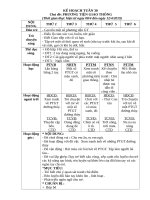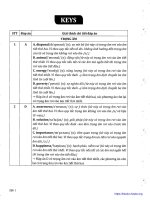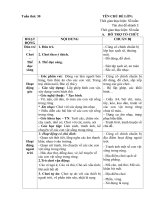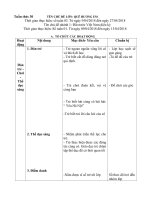30 chủ đề từ vựng ôn thi THPTQG TOPIC 13 RELATIONSHIPS
Bạn đang xem bản rút gọn của tài liệu. Xem và tải ngay bản đầy đủ của tài liệu tại đây (111.19 KB, 15 trang )
TOPIC 13: RELATIONSHIPS
I. VOCABULARY
Từ
loại
Phiên âm
Adolescent
n
/ˌỉdəˈlesnt/
Preadolescent
n
/pri:ˌỉdəˈlesnt/
2
Betray
v
/bɪˈtreɪ/
3
Cognitive
a
/ˈkɒɡnətɪv/
4
Commiserate
v
/kəˈmɪzəreɪt/
5
Conflict
n
/ˈkɒnflɪkt/
6
Conservative
a
/kənˈsɜːvətɪv/
Constant
a
/ˈkɒnstənt/
bền lịng, kiên trì
Constancy
n
/ˈkɒnstənsi/
sự kiên trì
8
Contactable
a
/ˈbredwɪnə(r)/
có thể liên lạc được
9
Counsellor
n
/ˈkaʊnsələ(r)/
hội đồng
10
Critical-thinking
a
/ˌkrɪtɪkl ˈθɪŋkɪŋ/
tư duy phản biện
11
Debate
n
/dɪˈbeɪt/
cuộc tranh luận
12
Deceive
v
/dɪˈsiːv/
lừa gạt, lừa dối
13
Delinquency
n
/dɪˈlɪŋkwənsi/
14
Discrimination
n
/dɪˌskrɪmɪˈneɪʃn/
sự phân biệt, sự tách bạch
15
Ego-centrism
n
/ˌiːɡəʊˈsentrɪzəm/
tự cho mình là trung tâm
16
Etiquette
n
/ˈetɪkət/
Faith
n
/feɪθ/
Faithful
a
/ˈfeɪθfl/
adv
/ˈfỉʃnəbli/
adv
/ˈflỉʃɪli/
hào nhống, lịe loẹt
Favor
n
/ˈfeɪvər/
sự u thích
Favorite
a
/ˈfeɪvərɪt/
u thích
Favorable
a
/ˈfeɪvərəbl/
thuận lợi
Favorably
adv
/ˈfeɪvərəbli/
một cách thuận tiện
n
/fəʊ/
STT
1
7
17
18
19
20
Từ vựng
Fashionably
Flashily
Foe
Nghĩa
thanh niên
vị thành niên
phản bội
thuộc về nhận thức
thương hại
cuộc xung đột
bảo thủ
sự phạm tội, phạm pháp
nghi thức
sự tin tưởng, niềm tin
tin tưởng
một cách hợp thời trang
kẻ thù
Honesty
n
/ˈɒnəsti/
tính trung thực
Honest
a
/ˈɒnɪst/
trung thực
Dishonest
a
/dɪsˈɒnɪst/
khơng trung thực
22
Hospitable
Hospitality
a
/hɒˈspɪtəbl/
hiếu khách
n
/ˌhɒspɪˈtỉləti/
23
Hypocrisy
n
/hɪˈpɒkrəsi/
24
Idealism
n
/aɪˈdiːəlɪzəm/
25
Inconsistency
n
/ˌɪnkənˈsɪstənsi/
26
Judgmental
a
/dʒʌdʒˈmentl/
vội phán xét
27
Juvenile
a
/ˈdʒuːvənaɪl/
(thuộc) thanh thiếu niên
28
Long-lasting
a
/ˌlɒŋˈlɑːstɪŋ/
kéo dài
29
Lovey-dovey
a
/ˌlʌvɪˈdʌvɪ/
yêu thương, âu yếm
Loyalty
n
/ˈlɔɪəlti/
sự trung thành
Loyal
a
/ˈlɔɪəl/
trung thành
adv
/lʌɡˈʒʊərɪəntli/
21
30
lòng hiếu khách
đạo đức giả
chủ nghĩa duy tâm
tính khơng nhất qn
31
Luxuriantly
32
Mature
a
/məˈtʃʊə(r)/
33
Mock
v
/mɒk/
chế nhạo
34
Monotonous
a
/məˈnɒtənəs/
đơn điệu
35
Mutual
a
/ˈmjuːtʃuəl/
36
Ostentatiously
adv
/ˌɒstenˈteɪʃəsli/
Plainly
adv
/ˈpleɪnli/
một cách rõ ràng
Soberly
adv
/ˈsəʊbəli/
đúng mực, chín chắn
37
38
Pregnancy
n
/ˈpreɡnənsi/
39
Puberty
n
/ˈpjuːbəti/
Selfish
a
/ˈselfɪʃ/
Selfishness
n
/ˈselfɪʃnəs/
Self-supporting
a
/ˌself səˈpɔːtɪŋ/
Self-confident
a
/ˌself ˈkɒnfɪdənt/
Self-confessed
a
/ˌself kənˈfest/
Self-determining
a
/ˌself dɪˌtɜːmɪnɪŋ/
Sincerity
n
/sɪnˈserəti/
Sincere
a
/sɪnˈsɪr/
40
41
42
một cách phồn thịnh
chín chắn, trưởng thành
chung, tương hỗ
phơ trương, khoe khoang
sự mang thai
tuổi dậy thì
ích kỉ
sự ích kỉ
tự trang trải
tự tin
tự thú, tự nhận
tự quyết
sự chân thành
chân thành
43
Spouse
n
/spaʊs/
44
Suspicion
Suspicious
n
/səˈspɪʃn/
sự nghi ngờ
a
/səˈspɪʃəs/
nghi ngờ
n
/ˈsɪmpəθi/
sự đồng cảm
45
Sympathy
Sympathize
Sympathetic
v
/ˈsɪmpəθaɪz/
a
/ˌsɪmpəˈθetɪk/
Tease
v
/tiːz/
Tolerate
v
/ˈtɒləreɪt/
tha thứ, chịu đựng
Tolerant
a
/ˈtɒlərənt/
biết tha thứ
Tolerance
n
/ˈtɒlərəns/
sự tha thứ
Tolerable
a
/ˈtɒlərəbl/
có thể tha thứ
Ultra-sensitive
a
/ˈʌntrəˈsensitiv/
cực kì nhạy cảm
Vivid
a
/ˈvɪvɪd/
chói lọi, sặc sỡ
adv
/ˈvɪvɪdli/
một cách chói lọi, sặc sỡ
Vividness
n
/ˈvɪvɪdnəs/
sự chói lọi, sự sặc sỡ
Well-being
n
/ˈwel biːɪŋ/
trạng thái hạnh phúc
46
47
48
49
50
Vividly
vợ chồng
đồng cảm
biết thông cảm, đồng cảm
chọc ghẹo, trêu chọc
II. STRUCTURES
STT
Cấu trúc
1
A friend to all is a friend to none
2
Ask out
Go out
Eat out
Hang out
3
Nghĩa
ai cũng thân thì chẳng thân với ai cả
mời hẹn hị, hẹn hị (ai đó)
mất điện/ ra ngồi/ đi chơi (hẹn hị)
đi ăn hàng
gặp bạn bè để giải trí và tán dóc
4
Blow the whistle on st
tố giác, vạch mặt ai
Break the ice: làm cho người chưa gặp bao giờ cảm thấy thoải mái và bắt đầu
nói chuyện với nhau
5
Change one’s mind
thay đổi ý định
6
Come as no surprise
khơng có gì đáng ngạc nhiên
7
Domestic violence
bạo lực gia đình
8
Fade away
phai nhạt dấn
9
Fall head over heels in love with sb = be completely in love: thật lòng yêu ai
10
Fall out with sb
cãi nhau với ai
11
Follow in one's footsteps
tiếp bước ai
12
Forbid sb from doing st
cấm ai làm gì
13
Forgive sb for st/doing st
tha thứ cho ai về cái gì/vì đã làm gì
14
Generation gap
khoảng cách thểhệ
15
Harmonize with
Have respect for = look up to
Look down on
thân thiện, thuận hịa với
17
Have st in common
có điểm gì chung
18
Help sb out
giúp đỡ ai
19
Hesitate to do st
chần chừ, do dự làm gì
20
Impose st on sb
áp đặt cái gì cho ai
21
In no time = very quickly
nhanh chóng
22
Lend a sympathetic ear to sb
cảm thông với ai
23
Let sb down = disappoint sb
làm cho ai đó thất vọng
24
Make allowance for
chiếu cố
25
Make believe = pretend
giả vờ
26
Make up with sb
làm hòa với ai
27
Make use of
tận dụng
28
Pop the question
cầu hơn ai
29
Reconcile with sb
hịa giải với ai
30
See eye to eye with sb = agree with sb = approve of sb: đồng tình với ai
31
Share st with sb
chia sẻ cái gì với ai
32
Significant other
người thương, người yêu
33
Stab in the back
nói xấu sau lưng
34
Strike up a friendship with sb
kết thân với ai
35
Sympathize with sb/st
cảm thơng với ai/cáigì
36
Tell a lie to sb
nói dối ai
37
The more the merrier
càng đơng càng vui
38
Threaten to do st
đe dọa làm gì
39
Tune (sb/st) out
phớt lờ ai/cái gì
16
III. PRACTICE EXERCISES
kính trọng coi thường
Exercise 1: Mark the letter A, B, C or D to indicate the word that differs from the other
three in the position of primary stress in each of the following questions.
Question 1: A. acquaintance
B. unselfishness
Question 2: A. experience
C. incapable
D. loyalty
B. mobility
C. independent
D. prioritize
Question 3: A. argument
romantic
B. counsellor
C. reconcile
D.
Question 4: A. friendship
B. sorrow
C. quality
D. confide
Question 5: A. generational
C. discrimination
B. interpersonal
D. nationality
Exercise 2: Mark the letter A, B, C, or D indicate the word whose underlined part differs
from the other three in pronunciation in each of the following questions.
Question 6: A. concerned
gossiped
B. rumored
C. sympathized
D.
Question 7: A. break
B. breath
C. thread
D. tread
Question 8: A. enough
B. plough
C. rough
D. tough
Question 9: A. amazing
Question 10: A. humor
B. charge
B. mutual
C. female
C. mature
D. taste
D. pursuit
Exercise 3: Mark the letter A, B, C, or D to indicate the correct answer to each of the
following questions.
Question 11: One advantage of living in a/an
between young children and adults.
is to strengthen relationship
A. nuclear family
house
B. nuclear house
C. extended family
D. extended
Question 12: Good friendship should be based on
understanding.
A. mutual
B. unselfish
C. instant
D. deep
Question 13: It makes sense to say that friendship can be compared to a tree. Its seed
should find good soil and under
conditions it will grow into a tree.
A. favor
B. favorite
C. favorable
D. favorably
Question 14: Generation
is the difference in the thoughts and viewpoints
amongst generations living together.
A. distance
B. gap
C. space
D. hole
Question 15: Being friends means making
tolerant to each other moods.
A. allowance
B. believe
for the other person's faults, being
C. use
Question 16: Do not hesitate to accept
A. hospitable
B. hospitality
because you can't give it in turn.
C. hospital
D. hospitably
D. fun
Question 17: My parents don't let me get married until I graduate from university and
they never
their mind about that.
A. keep
B. impose
C. focus
D. change
Question 18: The
arises when Jack and his parents have considerable
disagreement on his choice of university.
A. discrimination
B. conflict
C. agreement
D. debate
Question 19: The most important thing about friends for me is being able to share
secrets, to tell each other your problems and share your worries, to help each other
A. on
B. at
C. in
D. out
Question 20: Since the family law was implemented,
violence has been a rare
occurrence in this area.
A. domestic
B. household
C. internal
D. family
Question 21: I tried to
theice by talking to the people next to me about the
weather.
A. take
B. break
C. make
D. bake
Question 22: That their close friendship
surprise.
A. brings about
B. puts up
a romantic relationship comes as no
C. takes over
D. turns into
Question 23: In my opinion, an ideal friend should possess such qualities as honesty,
sincerity, faith,
and respect in attitude to you.
A. tolerate
B.tolerant
C. tolerance
D. tolerable
Question 24: She'd fallen
with her boyfriend over his ex-girlfriend.
A. apart
B. away
C. out
D. over
Question 25: A friend is a person who can help you in no time, lend you a hand, who
supports you in all your beginnings and who will never
you.
A. mock
B. deceive
C. tease
D. pretend
Question 26: All the three boys seem to fall
A. head
B. heart
Question 27: She says she has kissed and
a fun night.
A. caught
B. done
overheels in love with her.
C. mind
D. soul
up with Nigel, and the reunion was
C. made
D. took
Question 28: Such people think that a boy-friend can never
false stories
about you or tell your secrets to the entire world, but to my mind it depends on his
moral qualities.
A. tell
B. share
C. announce
D. spread
Question 29: To my mind everyone can have only one or two true friends, because a
friend to all is a friend to
A. no
B. nothing
C. none
D. not
Question 30: I believe that faithful friend can brighten your life and make it more
interesting,
and enjoyable.
A. vividity
B. vivid
C. vividly
D. vividness
Question 31: Due to financial conflict over years, they decided to get
A. divorced
B. engaged
C. married
D. proposed
Question 32: We started
out together before we realized we were in love.
A. asking
B. eating
C. going
D. hanging
Question 33: You shouldn't tell a lie to your friend, there mustn't be
in your
speech and even in thoughts.
A. suspicion
B. constancy
C. hospitality
D. hypocrisy
Question 34: Parents are always willing to lend a sympathetic
to their
children when they have problems.
A. hand
B. ear
C. eye
D. paw
Question 35: According to the dictionary, friendship is a feeling and
that
exist between people, but what these feelings are and what this behavior is everyone
should decide for himself.
A. behavior
B. behave
Question 36: Anna often dresses
her friends' attention.
A. plainly
B. properly
C. behaved
D. behaviors
when going to the parties in order to attract
C. flashily
Question 37: After graduating from university she
starting her own business.
A. followed in
B. succeeded in
C. went after
D. soberly
her mother's footsteps,
D. kept up
Question 38: My grandpa is the most conservative person in my family. He never
about way of life.
A. gives his opinion
B. changes his mind
C. makes up his mind
D. keeps in mind
Question 39: He had been lied to and
were his friends.
A. knew
B. stabbed
in the back by people that he thought
C. gripped
D. tabbed
Question 40: The company stopped using certain chemicals only after some workers
the whistle on it.
A. blew
B. threw
C. flew
D. chew
Exercise 4: Mark the letter A, B, C, or D on your answer sheet to indicate the
word(s) CLOSEST in meaning to the underlined word(s) in each of the following
questions.
Question 41: Being his close friend, I always sympathize with his interests and aims.
A. apologize
B. commiserate
C. believe
D. forgive
Question 42: Jen had confided her secret to Mark; but he betrayed her trust.
A. took out
B. took up
C. took in
D. took over
Question 43: Although Mary and John have a lot in common, they are always
arguing endlessly.
A. live together
B. spend lots of time together
C. share similar ideas D. share accommodation
Question 44: We have established long-lasting business relationships with a wide
range of clients.
A. short-time
B. durable
C. changeless
D. certain
Question 45: They were finally reconciled with each other, after not speaking for
nearly five years.
A. contactable
B. harmonized
C. opposed
D. truthful
Question 46: When couples encounter problems or issues, they may wonder when it is
appropriate to visit a marriage counsellor.
A. advisor
B. director
C. professor
D. trainer
Question 47: Four generations living in the same roof will have different viewpoints
of lifestyle.
A. attitudes
B.rules
C. manners
D. opinions
Question 48: My point is that having table manners gives me the confidence to eat
with my peers.
A. etiquette
B.rule
C. problem
D. norm
Question 49: We need a true friend to share with us our joys and sorrows.
A. delights and sadness
B. tiredness and sadness
C. boredom and freedom
D. delights and boredom
Question 50: In the United States, friendship can be close, constant, intense, generous
and real, yet fades away in a short time if circumstances change.
A. gains importance
B. vanishes rapidly
C. slowly disappears
D. changes quickly
Question 51: Mary has a strong desire to make independent decisions.
A. self-supporting
B. self-confident
C. self-confessed
D. self-determining
Question 52: The apartment is located in a flashily modernized old building.
A. luxuriantly
B. ostentatiously
C. cheaply
D. fashionably
Question 53: I feel extremely depressed as conflict occurs frequently amongst
generations in my family.
A. comes on
B. comes up
C. comes in
D. comes into
Question 54: If two people in a romantic relationship are lovey-dovey, they show their
love for each other in public by touching each other and saying loving things.
A. lovesick
B. romantic
C. tragic
D. affectionate
Question 55: Friends, neighbors and significant others are all welcome. To me, the
more, the merrier.
A. lovers
B. foes
C. mates
D. spouses
Exercise 5: Mark the letter A, B, C, or D on your answer sheet to indicate the
word(s) OPPOSITE in meaning to the underlined word(s) in each of the following
questions.
Question 56: If you want to get a good result in every work, you should have a
constancy.
A. sympathy
B. loyalty
C. unselfishness
D. fluctuation
Question 57: Close friends must know each other so well that there can be no
suspicion between them.
A. trust
B. intimate
C. doubt
D. loyalty
Question 58: Luckily, my parents are always willing to listen to my new ideas. They're
very open-minded.
A. narrow-minded
B. broad-minded
C. absent-minded
D. fair-minded
Question 59: My mother is very strict and forbids me from going home after 10 p.m.
every day.
A. motivates
B. allows
C. discourages
D. threatens
Question 60: Many parents find it hard to understand their children when they are
teenagers.
A. adults
B. elders
C. adolescents
D. kids
Question 61: Those who are easily influenced by rumors cannot be true friends.
A. affected
B. forced
C. distracted
D. encouraged
Question 62: Older people tend to be more conservative and a bit suspicious of
anything new.
A. progressive
B. traditional
C. retrogressive
D. conventional
Question 63: She teaches the students to have respect for different races and
appreciate the diversity of other cultures.
A. look up to
B. look forward to
C. look for
D. look down
on
Question 64: She was so happy when he got down on bended knee and popped the
question.
A. asked her out
B. asked her to be on a date
C. left her
D. asked her to marry him
Question 65: My sister didn't see eye to eye with me about how to tell my parents
about the problem.
A. agree
B.disagree
C. disapprove
D. oppose
Question 66: She became deeply depressed when her husband died.
A. desperate
B.pessimistic
C. satisfied
D. unhappy
Question 67: Unlike her sister, Walker was a mature lady when she married.
A. annoyed
B. childish
C. energetic
D. sensitive
Question 68: Most of what he says is such garbage that I just tune him out.
A. avoid
B. ignore
C. neglect
D. regard
Question 69: Don’t confess your love to your friends unless you know they feel the
same way.
A. admit
B. conceal
C. declare
D. expose
Question 70: He gets really jealous if his girlfriend strikes up a friendship with
another man.
A. cover up
B. give up
C. make up
D. remain
Exercise 6: Read the following passage and mark the letter A, B, C, or D on your
answer sheet to indicate the correct word or phrase that best fits each of the
numbered blanks from 71 to 75.
As William Chopik, associate professor of psychology and author of the study says:
"Friends are a conscious choice. Family relationships can be serious, negative and
monotonous." The research included two studies - one a broad survey of nearly
300,000 people, aged between 15 and 99, from more than 90 countries. This study
found that those (71)
valued friendships highly were healthier and happier
(according to their own reports), especially as they got older. The second study used
data from a us survey of 7,481 people over 50. Subjects were questioned about the
quality of their friendships - how much friends understood them and how much they let
them down.
When friendships were reported as being stressful, people reported (72)
rates
of disease. When friends were supportive, people were healthier. Most of the
friendships were reported as being supportive. Family, (73)
, were found to
have little influence on an individual's health and wellbeing. Spouses and children had
some effect, but not as much as friends.
Chopik says he isn't suggesting we ignore our families, but that friends make us feel
better. "With friends you are more likely (74)
do activities – they provide an
outlet. You can say things to friends and they are less judgmental. There is a distance
there that provides a level of honesty." He says that cultivating good-quality
friendships across our lives is beneficial - raising self-esteem and (75)
against
stress.
(Adapted from https://www, theguardian.com)
Question 71: A. whom
Question 72: A. highly
B. who
B. high
C. whose
C. higher
D. which
D. highest
Question 73: A. however
otherwise
B. moreover
C. additional
D.
Question 74: A. with
B. on
C. to
D. of
Question 75: A. reducing
buffering
B. causing
C. placing
D.
Exercise 7: Read the following passage and mark the letter A, B, C, or D on your
answer sheet to indicate the correct answer to each of the questions from 76 to 80.
In most families, conflict is more likely to be about clothing, music, and leisure time
than about more serious matters such as religion and core values. Family conflict is
rarely about such major issues as adolescents' drug use and delinquency. Nevertheless,
it has been estimated that in about 5 million American families (roughly 20 percent],
parents and adolescents engage in intense, prolonged, unhealthy conflict. In its most
serious form, this highly stressful environment is associated with a number of negative
outcomes, including juvenile delinquency, moving away from home, increased school
dropout rates, unplanned pregnancy, membership in religious cults, and drug abuse
(Steinberg & Morris, 2001).
Many of the changes that define adolescence can lead to conflict in parent-adolescent
relationships. Adolescents gain an increased capacity for logical reasoning, which leads
them to demand reasons for things they previously accepted without question, and the
chance to argue the other side (Maccoby, 1984). Their growing critical-thinking skills
make them less likely to conform to parents' wishes the way they did in childhood.
Their increasing cognitive sophistication and sense of idealism may compel them to
point out logical flaws and inconsistencies in parents' positions and actions.
Adolescents no longer accept their parents as unquestioned authorities. They recognize
that other opinions also have merit and they are learning how to form and state their
own opinions. Adolescents also tend toward ego-centrism, and may, as a result, be
ultra-sensitive to a parent's casual remark. The dramatic changes of puberty and
adolescence may make it difficult for parents to rely on their children's preadolescent
behavior to predict future behavior. For example, adolescent children who were
compliant in the past may become less willing to cooperate without what they feel is a
satisfactory explanation.
(Adaptedfrom />Question 76: What is the passage mainly about?
A. The dramatic changes of puberty and adolescence.
B. How to solve conflict in family.
C. The conflict in parent-adolescent relationship.
D. A satisfactory explanation for family conflict.
Question 77: According to the passage, what is probably TRUE about the conflict
often arising in a family?
A. adolescents' drug use and delinquency
B. clothing, leisure time and music
C. religion and core values
D. children's behavior
Question 78: The word "unplanned" the first paragraph is closest in meaning to 7
A. unintended
B. designed
C. developed
D. shaped
Question 79: Adolescents become less likely to comfort to parents' wishes the way
they did in the past because.............................
A. the environment is highly stressful
B. their critical-thinking skills is growing
C. it is related to drug abuse
D. parent-adolescent relationships lead to conflicts
Question 80: According to the passage, the word "it" may refer to
A. remark
B. adolescent
C. ego-centrism
above
D. None of the









